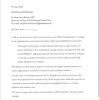Patients are supposed to be at the heart of everything the NHS does. This is considered such an important principle that, a decade ago, the fledgling NHS constitution was rewritten after the mid-Staffs scandal, in which so many patients died, to make clear it should frame every aspect of NHS work.
You’d think that would be self-evident. What else would be at the heart of health care?
Yet, last week, the NHS Confederation, the membership body for NHS providers, published guidance that appears to cut this ethos adrift. [Its stated objectives are incredibly important: supporting trans staff by helping healthcare leaders to understand their needs and address any workplace discrimination they may face.] But it also includes guidance on how to handle requests for same-sex care that gets the law badly wrong and could lead NHS trusts to unlawfully discriminate against female patients.
Brackets mine. I’m not sure I agree with the (no doubt obligatory) stipulations in the brackets. I’m not sure I think the NHS should even be hiring trans people for work involving patients, given the state of the ideology around “trans” and the peremptory bullying demands that issue from that ideology. That of course would be “discrimination” and probably illegal…but the reality is that trans people are encouraged to be nuisances and time-wasters and attention-hogs at best and persecutors of women at worst.
The NHS Confederation cannot override the law and is not a statutory body like the CQC. Yet its guidance directly contradicts it. It claims it would be “discriminatory” for a patient to refuse to be treated by a trans healthcare professional of the opposite sex unless “evidenced clinical harm may result”. This is legal gibberish – individuals are not directly bound by equalities law in their conduct as patients – and the law does not say providers should only accept requests if there would otherwise be clinical harm.
Its guidance wrongly claims it would probably be discriminatory for a provider to honour a request for same-sex care by excluding trans staff of the opposite sex if the request has “no clinical merit”, opines without basis that there will be “extremely few circumstances” where this request is lawful and says “patients expressing any such view should be informed of the discriminatory nature of their request [and] that such behaviour is unacceptable”. It does not even mention the law on consent.
Again, this is the result of years of drip drip drip indoctrination. Of course women shouldn’t be forced to have a man inspecting her genitals because he claims to be a woman. It’s obvious yet people have been relentlessly trained to think (or at least say) it’s twanzphobic. Drip drip drip indoctrination will do that to you.








